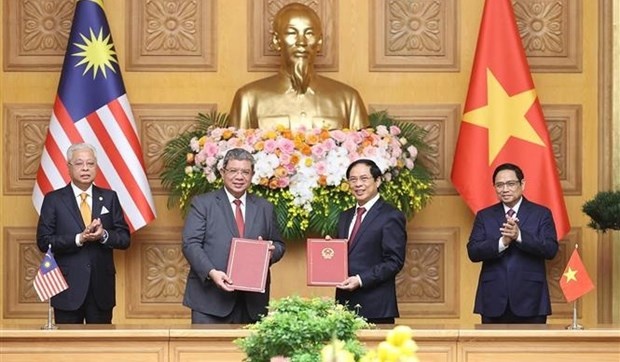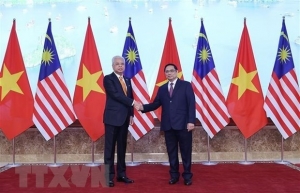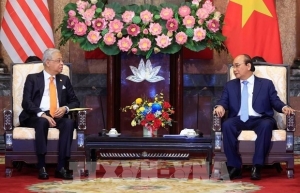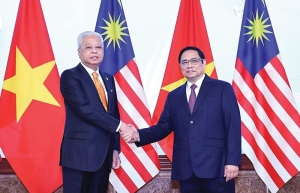Intensifying bilateral trade and investment links between Vietnam and Malaysia
Malaysia has officially become the ninth country to ratify the 11-member Comprehensive and Progressive Agreement for the Trans-Pacific Partnership (CPTPP) following years of careful deliberation and consultation by the government.
 |
| Vietnamese Prime Minister Pham Minh Chinh (first, right) and his Malaysian counterpart Ismail Sabri Yaakob (first, left) witness the exchange of a letter of intent on cooperation between the diplomatic academies of the two countries' foreign minsitries on March 21. (Photo: VNA) |
The CPTPP will take effect for Malaysia on November 29, leaving Brunei and Chile as the only countries yet to ratify the trade pact.
“Malaysia’s addition as a party to the CPTPP will further deepen economic integration, boost the economic coverage of the agreement, and enhance the mutual benefits that parties reap from the CPTPP,” said a joint ministerial statement released after the sixth meeting of the CPTPP Commission hosted by Singapore on October 8.
According to Vietnam’s Ministry of Industry and Trade, the entry into force of the CPTPP for Malaysia will enable this deal to bring positive benefits in trade and investment to both nations. Moreover, this deal will also help further intensify the two countries’ strategic partnership forged in 2013, with trade and investment being the key cooperation pillar.
Vietnam, which adopted this pact in November 2018, and Malaysia have “agreed to further facilitate the expansion of investment in the two countries, particularly in high potential areas such as automation, smart logistics, innovation, high technology, digital economy, and digital transformation,” said a joint press statement released recently and highlighting the crucial role of the CPTPP for both nations’ trade and investment cooperation.
To beef up ties, Vietnam and Malaysia are now accelerating negotiations for a new agreement on air services, and have mutual recognised their COVID-19 vaccination certificates, which will facilitate the safe and regular commercial travel between both countries.
During an official visit in March to Vietnam by Malaysia’s Prime Minister Dato’ Sri Ismail Sabri Yaakob, he and his Vietnamese counterpart Pham Minh Chinh pledged to provide the best conditions for investment inflows in their respective territories, as this will help them to reach a bilateral trade turnover of $18 billion or higher by 2025, from $16.71 billion last year, up 41.6 per cent on-year.
Their bilateral trade value was around $7.8 billion in the first half of 2022, up 23 per cent on-year.
Last year, Malaysia ranked second in ASEAN and ninth in the world among the trade partners of Vietnam, which in turn was the third-largest trade partner of the former. Vietnam exports mainly telephones and components, crude oil, rice coffee, and seafood to Malaysia while importing mostly computers, electronic products, machinery, equipment, petrol, household appliances and components, and chemicals.
Vietnam and Malaysia have also vowed to expand ties in the fields of agro-forestry-fishery, halal food, and electronics. Notably, they will jointly devise a mechanism on exchanging information in trade remedies between the two countries.
According to the Vietnamese Ministry of Planning and Investment, as of September 20, Vietnam has 21 valid projects with registered capital totalling $853 million in Malaysia, making the latter the ninth biggest among the 78 overseas investment destinations of Vietnam. Also as of September 20, Malaysia ranked third among the ASEAN nations – after Singapore ($65.23 billion) and Thailand ($13 billion) – and 10th among the 139 countries and territories investing in Vietnam, with 690 valid projects worth over $13 billion.
A month ago, Malaysia’s ParkCity Property Holdings worked with the leadership of the Mekong Delta province of Long An, proposing the development of an urban and industrial complex in the province’s Ben Luc district on an area of about 2,600 hectares including a 36-hole golf course. Total investment capital remain unrevealed. In Vietnam, this group has also invested into developing the urban area ParkCity Ha Dong in Hanoi on an area of 77ha.
Over the past years, Vietnam and Malaysia have also been boosting bilateral ties in oil and gas. For example, Malaysia’s state-owned oil and gas giant Petroliam Nasional Bhd (Petronas) and its Vietnamese peer Vietnam Oil and Gas Group (PetroVietnam) are cooperating in exploration, exploitation, and supply of oil and gas services. The boosted cooperation will help both countries to hit the two-way trade target of $18 billion by 2025. In March 2019, Petronas and PetroVietnam inked a heads of agreement (HoA) for the sale and purchase of additional gas to Vietnam’s Ca Mau gas-power-and fertiliser complex. The HoA refers to a non-binding document that outlines the basic terms of a tentative partnership agreement or transaction.
Under the HoA, the complex would receive additional gas of one billion cubic metres per year to solve the gas shortage.
The $2 billion complex includes a PM3-CM gas pipeline, the CM1 and CM2 power plants, the Ca Mau fertiliser plant, and other facilities.
Another Malaysian-backed investment project is the Duyen Hai 2 Thermal Power Plant worth $2.4 billion in the Mekong Delta province of Tra Vinh. The plant has become operational, with a total capacity of 1,320MW for two turbines. Its investor is Janakuasa Sdn. Bhd.
 | Vietnam, Malaysia issue joint press statement Vietnam and Malaysia have issued a joint press statement within the framework of the Vietnam visit by Prime Minister Dato’ Sri Ismail Sabri bin Yaakob and a high-ranking delegation of the Malaysian Government at the invitation of Prime Minister Pham Minh Chinh. |
 | President suggests Vietnam, Malaysia take advantage of FTAs President Nguyen Xuan Phuc has recommended Vietnam and Malaysia capitalise on free trade agreements of which both are members, particularly the Comprehensive and Progressive Agreement for Trans-Pacific Partnership (CPTPP) and the Regional Comprehensive Economic Partnership (RCEP). |
 | Vietnam’s Malaysian ties hit higher gear The mutual recognition of vaccination certificates between Vietnam and Malaysia, in addition to both nations’ joint facilitation of bilateral trade and investment activities, will help them expand ties further in these sectors. |
What the stars mean:
★ Poor ★ ★ Promising ★★★ Good ★★★★ Very good ★★★★★ Exceptional
Related Contents
Latest News
More News
- Kurz Vietnam expands Gia Lai factory (February 27, 2026 | 16:37)
- SK Innovation-led consortium wins $2.3 billion LNG project in Nghe An (February 25, 2026 | 07:56)
- THACO opens $70 million manufacturing complex in Danang (February 25, 2026 | 07:54)
- Phu Quoc International Airport expansion approved to meet rising demand (February 24, 2026 | 10:00)
- Bac Giang International Logistics Centre faces land clearance barrier (February 24, 2026 | 08:00)
- Bright prospects abound in European investment (February 19, 2026 | 20:27)
- Internal strengths attest to commitment to progress (February 19, 2026 | 20:13)
- Vietnam, New Zealand seek level-up in ties (February 19, 2026 | 18:06)
- Untapped potential in relations with Indonesia (February 19, 2026 | 17:56)
- German strengths match Vietnamese aspirations (February 19, 2026 | 17:40)

 Tag:
Tag:




















 Mobile Version
Mobile Version